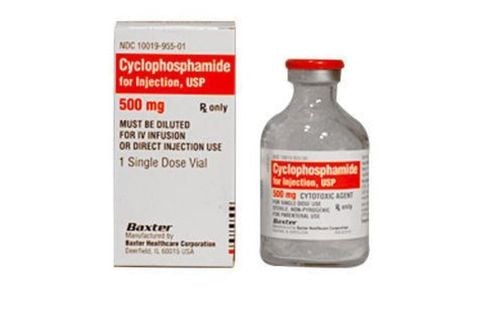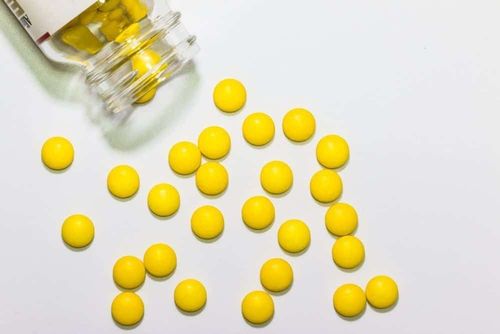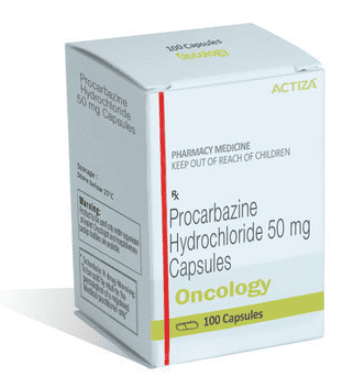This is an automatically translated article.
Procarbazine is also known as Matulane. It is used together with other chemotherapy drugs to treat Hodgkin's lymphoma. Procarbazine belongs to the group of alkylating agents. The drug works by slowing or stopping the growth of cancer cells.1. What is Procarbazine?
Procarbazine is also known as Procarbazine Matulane. Procarbazine exerts its anti-cancer effects by a process called alkylation. Alkylation is the process of damaging a cell's DNA, preventing cell division and causing cell death. This is because cancer cells in general divide faster and with less error correction than healthy cells, so cancer cells are often more sensitive to this damage.2. How to use Procarbazine?
Procarbazine is available in tablet form and can be taken directly, with or without food. You should take Procarbazine at the same time of day to minimize possible forgetting.
In case you miss a dose by less than 12 hours, you should take the missed dose and then resume your regular dosing schedule.
It is important to make sure that you are using the correct dose of Procarbazine each time.
3. Procarbazine drug interactions
You should avoid the use of alcoholic beverages during treatment with Procarbazine. The combination of alcohol and the drug Procarbazine can cause unpleasant side effects. Avoid using Procarbazine with specific Tyramine-rich foods such as wine, yogurt, ripe cheeses, and bananas. Avoid consuming foods rich in tyramine while using the drug Procarbazine which can increase your blood pressure Avoid using a combination of multiple medications including tranquilizers, antihistamines, narcotics, and the drug Procarbazine. Avoid smoking while being treated with Procarbazine because it can increase your risk of developing lung cancer. Depending on the medications you take, you may need to change the schedule or dosage of your medications because of their interactions, or change one of your therapies. You need to tell your treating doctor or other health professionals about any changes that need to be made.
4. How to store Procarbazine
4.1. Self-storage Store Procarbazine in its original, labeled packaging at room temperature and in a dry place (unless otherwise directed by your treating physician or other healthcare professional). Procarbazine should not be stored in the medicine box. Keep the medicine container out of the reach of children and pets. Do not flush Procarbazine tablets or their packaging down the toilet or throw them in the trash. 4.2. If your caregiver is preparing a dose for you, the caregiver should consider wearing gloves. An alternative is to pour Procarbazine directly from their container into a cap, small cup, or directly into your hand. Caregivers should avoid direct contact with the tablet. Caregivers should always wash their hands before and after administering Procarbazine to a patient. Pregnant or nursing women should not prepare doses of Procarbazine.
5. Undesirable effects when using the drug Procarbazine
Here are some of the common or possible side effects of using Procarbazine:
5.1. Nausea or vomiting a lot When you experience nausea or vomiting a lot after using Procarbazine, there are several solutions as follows:
Talk to your treating doctor to get a prescription for medicine to help you control it. control nausea and vomiting. Dietary changes: Avoid foods that can worsen symptoms, such as foods that are high in fat, fat, spices, or acids, such as lemons and limes. tomato or orange. Gargle daily with salt water or drink more ginger tea to relieve discomfort. 5.2. Decrease in white blood cell count White blood cells play a very important role in fighting infections. While being treated, your white blood cell count may drop, putting you at higher risk of infection. Warning signs of an infection are a fever above 38 degrees, accompanied by a sore throat or cold, trouble breathing, cough, burning when urinating, or pain that doesn't heal.
5.3. Low red blood cell count (anemia) Your red blood cells have a role in carrying oxygen to the tissues in your body. When your red blood cell count is low, you may feel tired or weak. You should tell your treating doctor if you experience shortness of breath, shortness of breath or chest pain. If your red blood cell count is too low, your doctor may order a blood transfusion.
5.4. Decreased Platelet Count Platelets are important factors in blood clotting, so when your platelet count is low, you have a higher risk of bleeding. Watch out for warning signs of a low platelet count such as any excessive bruising or bleeding, including bleeding gums, nosebleeds, or blood in your urine or stools. your blood. If your platelet count test is too low for a standard level, you may be given a platelet transfusion.
5.5. Mouth ulcers or mucositis Some cancer treatments can cause sores or sores on the lining of your mouth and throat. You should watch for signs such as your mouth, tongue, inside of your cheeks or throat becoming white, sore, or sore. Performing regular oral care can help prevent or control cold sores. If mouth sores become painful, your doctor may recommend pain medication.
5.6. Less common side effects Secondary malignancies: There is a risk of developing leukemia or another type of cancer during treatment with Procarbazine. This usually involves repeated treatment or the use of high therapeutic doses. You should avoid smoking if you are being treated with Procarbazine. There is an increased risk of developing lung cancer after treatment with this medicine, and smoking may increase the risk even more. CNS toxicity: may manifest as weakness, loss of balance or coordination, unsteadiness, dizziness or drowsiness. Notify your treating doctor immediately if you experience any of these symptoms. Allergic reactions: In some cases, you may have an allergic reaction to Procarbazine. Signs of a reaction may include shortness of breath or difficulty breathing, chest pain, rash, flushing or itchy skin, or a drop in blood pressure. Peripheral Neuropathy (Nightness or tingling in the hands and/or feet): Peripheral neuropathy is a toxic condition that affects the nerves. Procarbazine causes numbness or tingling in the hands or feet, which usually occurs when wearing socks or gloves. This condition can be aggravated by taking more doses of the drug. In some people, symptoms slowly go away after stopping the medication, but for some, it never goes away completely.
6. Effects of drugs on sex and reproduction
Exposure to procarbazine can cause birth defects, so you should not become pregnant or father a child while taking this medicine. Using birth control is necessary during treatment with Procarbazine, even if your periods have stopped or you believe you are no longer producing sperm. You should consult your doctor before breast-feeding while taking this medicine. Procarbazine can affect the reproductive system leading to menstrual cycles or sperm production becoming irregular or permanently stopping. Women treated with Procarbazine may experience menopausal effects including hot flashes and vaginal dryness. In addition, you may experience a decrease in sex drive during treatment. For men, you may want to consider sperm banking or egg harvesting if you may want to have children in the future. Discuss these options with your treating physician. Hopefully with the sharing of the drug Procarbazine will help the process of using the drug in patients effectively, minimizing side effects during use.
Follow Vinmec International General Hospital website to get more health, nutrition and beauty information to protect the health of yourself and your loved ones in your family.
Please dial HOTLINE for more information or register for an appointment HERE. Download MyVinmec app to make appointments faster and to manage your bookings easily.













